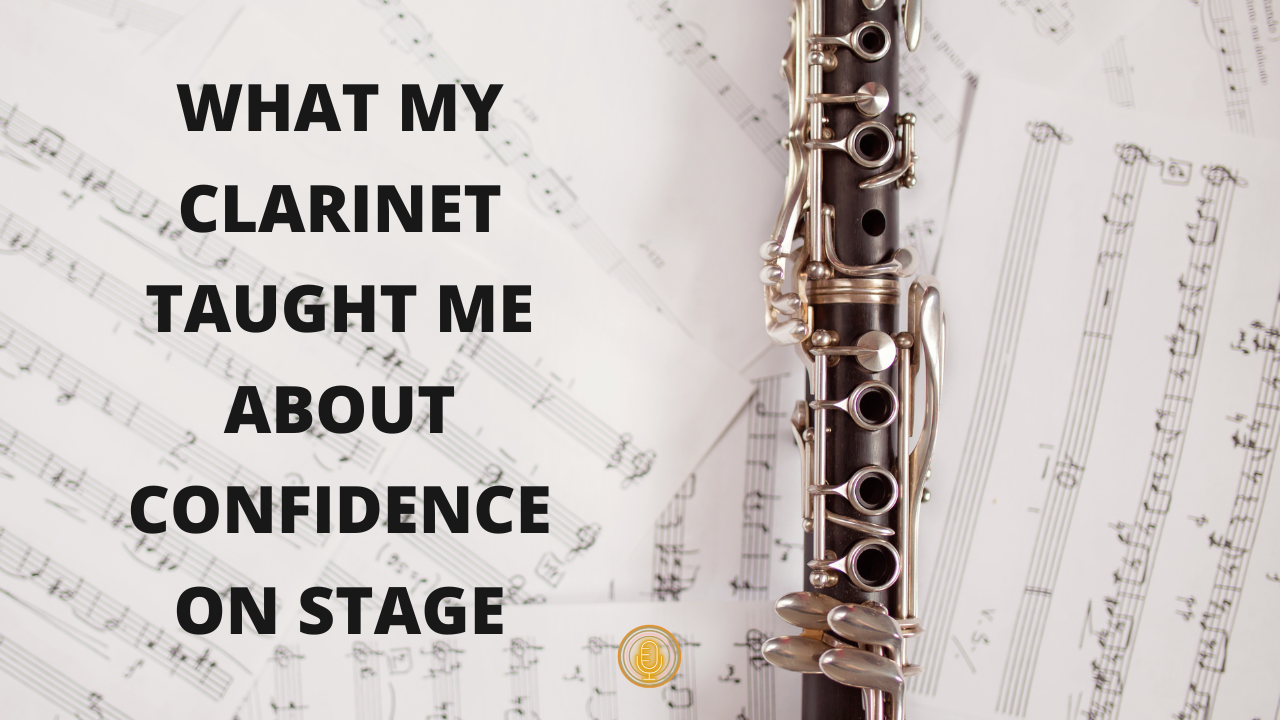What My Clarinet Taught Me About Confidence on Stage

Confidence doesn’t happen overnight. It’s built day by day, note by note, moment by moment, just like practicing a piece of music.
As a clarinetist with over 30 years of performance experience, I’ve learned that preparing a solo for performance is no different than preparing a speech for performance. Both require preparation, patience, and, most importantly, a willingness to grow from every experience—no matter how uncomfortable or imperfect. That willingness also includes acknowledging our fears of failure and doing it anyway.
When I first started playing solos in 7th grade, I would get so nervous. My hands would shake (making it difficult to hold my instrument), my breathing would get out of sync, and I’d forget to exhale all the way, and I sometimes questioned whether I was good enough to perform. And then, every time I did it, I felt amazing and received applause and congratulations from the audience. Just like the client I mentioned in last week’s article, I spent way too much time being nervous, when I could have just worked on my confidence instead.
I soloed many times throughout middle and high school, college, and even professional performances. I vividly remember one particular solo performance at a scholarship competition where I had practiced endlessly and I felt totally prepared, yet as I stepped onto the stage, doubt crept in. The bright lights, the watchful eyes, and the overwhelming silence as I prepped my first breath—it all felt like too much.
I remember closing my eyes briefly and taking a deep breath as I made eye contact with my accompanist. I imagined that it was just us in the practice room and I began playing. Was it perfect? No, but it was excellent. I definitely made mistakes, but that is part of the experience. Music is meant to be interpreted by the performer, and our mistakes become part of that interpretation. At the end, I received a standing ovation, and it felt amazing! I learned something invaluable that day—confidence isn’t about eliminating fear; it’s about moving forward despite it. I also won one of the scholarships at the event, so it was a win-win all around!
About ten years later, as a music major in college (I took a break for a few years before returning to college), I performed in a masterclass where my instrument unexpectedly malfunctioned mid-performance. At this point, I had been playing for over 17 years. You would think I could handle my nerves by then. On the contrary, I feel like this particular experience was the absolute pinnacle of my performance nerves. All started out well, but about halfway into my solo, my instrument had an issue, and I couldn’t resolve it.
My nerves kicked into high-gear and panic set in, but the instructor—a renowned clarinetist—stopped me and said, “It happens to all of us. Let’s focus on what you did before that moment.”
That experience taught me that even when things go wrong, there’s always something to celebrate. The lesson? Confidence isn’t about being flawless; it’s about embracing the process.
Why am I telling you this? What can you learn from my time as a clarinetist? Hopefully a few things! Here are three key takeaways about building confidence on stage, whether you’re performing music, delivering a speech, or stepping into any spotlight that I have learned as a musician over the last 3 decades:
Practice Makes Permanent
I’ve said it before, I’ll say it again, and again, and again. Preparation is the foundation of confidence. The more you practice, the more familiar you become with your material. But don’t just aim to memorize—strive to internalize. When you internalize your material, you know what’s coming and you don’t have to worry about it. Speak your words aloud, rehearse in environments that mimic the real setting, and get comfortable with the discomfort of performing. Practice doesn’t guarantee perfection, but it creates the muscle memory you’ll rely on when nerves kick in.
Learn to Adapt and Overcome
Just as I had to overcome an instrument malfunction, you’ll face unexpected challenges on stage. A missed word, a brain fart, an offbeat moment, or even technical difficulties can throw you off. Confidence comes from trusting yourself to recover. Take a deep breath, smile, regroup, and keep going. Your audience isn’t looking for perfection—they’re looking for connection.
Celebrate the Small Wins
Building confidence is like building a brick wall. You build it one brick at a time. Every step you take toward that builds that wall is a step toward a more confident you. You don’t have to lay all the bricks in one day. Start small. Speak up in a meeting or share your story in a small group. Those moments build the foundation for bigger stages. Reflect on your progress and remind yourself of how far you’ve come. Each small win brings you closer to your goals and strengthens your confidence.
Confidence is not a destination; it’s a journey. It’s built through repetition, resilience, and a willingness to embrace the imperfections along the way. My clarinet taught me that every missed note, every unexpected challenge, and every successful performance contributes to the musician—and the speaker—I’ve become.
Are you ready to build your confidence and let your voice be heard? If so, it’s time to take a deep breath, trust yourself, and step onto the stage. Whether your audience is one person or a thousand, you have something valuable to share and I want to help you share it. Let’s connect on a FREE discovery call and see if working together is right for you!
Let your story, like a beautiful and intriguing melody, inspire those who hear it.

